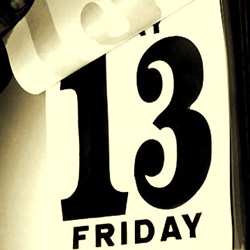 Most Americans have known about the superstition surrounding unlucky Friday the 13th since grade school. Some people take this superstition very seriously, refusing to fly on airplanes or even leave their houses. Others joke about it, take flashlight tours of spooky houses, or watch horror movies. But have you ever wondered how Friday the 13th got such a bad reputation in the first place?
Most Americans have known about the superstition surrounding unlucky Friday the 13th since grade school. Some people take this superstition very seriously, refusing to fly on airplanes or even leave their houses. Others joke about it, take flashlight tours of spooky houses, or watch horror movies. But have you ever wondered how Friday the 13th got such a bad reputation in the first place?
It turns out Friday the 13th draws its reputation from many sources throughout history, and our old friend Popular Culture keeps it there. The superstition stems from a marriage between the perception of the lack of luck involving the number 13 combined with a series of bad events that happened on Fridays. Here’s a quick rundown of events taken from history, myth, literature, and popular culture that may have contributed to keeping the superstition alive.
Let’s start with the ancient roots:

The first reference of unlucky 13 is believed to have occurred in an ancient Norse myth, where twelve gods are eating dinner and an unwelcome guest arrives. The 13th guest, named Loki, schemes to murder Baldur for trying to get him to leave. Killing the most beloved god of light, joy, purity, beauty, innocence, and reconciliation causes the entire earth to go dark in the very first “blackout.” A worldwide blackout is very unlucky indeed.
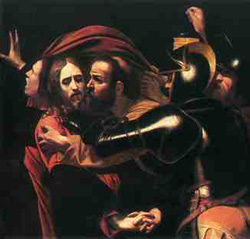
Our next set of references is found in the Bible—negative ones for both for Friday and for the number 13. There were twelve disciples with Jesus at the Last Supper and then Judas, the 13th guest, betrayed Jesus. Eve is believed to have tempted Adam on a Friday, and the Temple of Solomon was destroyed on a Friday. Of course, the crucifixion took place on, you guessed it, a Friday. It’s only fair to note that on the positive side, the human race was also created on a Friday.
Flashing forward a few centuries:
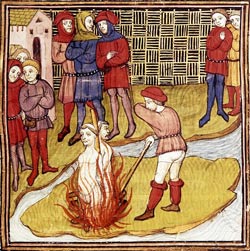
Many sources postulate that the destruction of the Knight Templar on Friday, October 13th, 1307 was the beginning of the superstition. The Knights Templar were religious crusaders during the Middle Ages whose job it was to protect Christian pilgrims as they journeyed to religious sites in Jerusalem. On this particular Friday the 13th, leader Jaques de Molay and 60 of his knights were arrested in Paris and charged with heresy. Why were religious knights charged with heresy? It seems the king of France owed them money and didn’t want to pay it back. This tie to Friday the 13th was further explored in Dan Brown’s popular work of fiction, The Da Vinci Code, published in 2003.
And into the 20th century (and beyond):

In seafaring cultures, Friday has long been considered an unlucky day to begin a voyage, with many sailors refusing to do so. There is actually an urban myth about a British Royal Navy ship named the HMS Friday that was built in the 1900s to dispel this superstition. But according to the myth, the ship sank anyway, reinforcing the unlucky Friday superstition. It makes a great story, but like many legends, it’s not true.
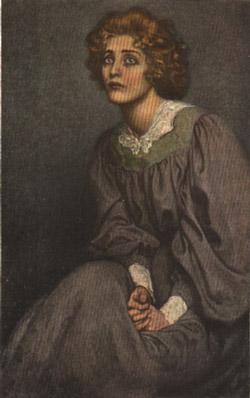
In 1907, a Wall Street high flier named Thomas W. Lawson published a novel called Friday the Thirteenth. The book is about a financier who picks Friday the 13th to create a false stock market panic, so that he can manipulate it for material gain. The book was very popular in its day. In an ironic coincidence, Lawson’s namesake ship, the only schooner ever built with seven masts, was wrecked on Friday the 13th of that same year. This furthered the unlucky reputation of the day. Lawson’s book is now in the public domain, and thanks to Project Gutenberg, you can read it online.
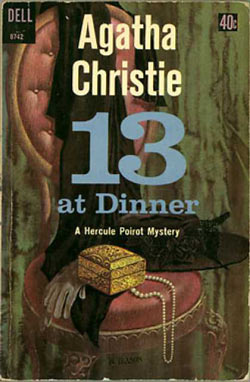
Christie’s 1933 novel tells the story of a murderous event that happens when thirteen people sit down to dinner. One of the guests is nervous because when thirteen guests sit down to dinner, the first one who leaves the table is marked for death. This sounds a little bit like Loki without the Norse gods or the Last Supper. This book has been a best seller and it’s been further immortalized in movies and TV episodes.

There is no doubt that the Friday the 13th horror film franchise (twelve films, a TV show, and piles of tie-in merchandise and novels) has for the last thirty years helped Friday the 13th stay in the American public consciousness as unlucky day. Although one could seriously argue that the success of this franchise and the terror that is invoked by the sight of Jason’s hockey mask is anything but unlucky for the owners of this lucrative franchise.
So there you have it, a selective history of possible events behind the superstition of Friday the 13th, from ancient times to present day. What’s your favorite theory?
Additional images via London Art News, Sablet Home and Ken Marschall.
Deborah Lacy has two black cats and occasionally walks under ladders. She can be found in speakeasies, book clubs and at Mystery Playground.

Informative, fun, timely piece. Thanks.
I’m off now to cancel my planned boating excursion for the day.
this website sucks
@BrianGreene – Good idea. Just don’t step on any cracks in the sidewalk while you’re on land.
Excellent read, thanks. I have not had anything bad happen to me today….yet. I try not to be superstitious but a healthy fear is ok!
Love this post – thank you and Happy friday the 13th, my lucky day 🙂
I loved this post! Friday the 13th has such a fun feeling to me, kind of like Halloween where you actually want to be scared. I loved that you not only looked into the background, but illustrated some 20th century links we have in movies and books. As always, I love reading the things you come up with on this blog. No pressure, but I can’t wait to see the Halloween post.
@Elizabeth Zguta – Happy Friday the 13th, right back at you. I’m so glad it’s your lucky day.
@Kerry – Thank you. Some pressure… I have no idea what I’ll write about Halloween. 🙂
I never really knew where this superstition came from. On a sad note, a passenger got hit by a car today at work.
Great Post! Not sure that I suffer from triskaidekaphobia and while I know that I am not a paraskevidekatriaphobic or even a friggatriskaidekaphobic, I certainly respect the day. I can not wait to read your next blog!! Keep going – your blog is informative and very entertaining.
@RebeccaL – That is so sad. So sad. I hope they’ll be ok.
@Trina – you are definitely not hilariousnessaphobic. Thank you.